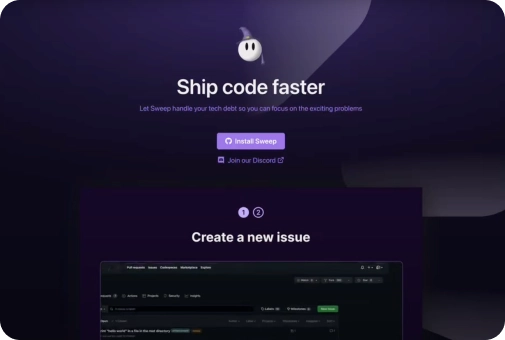Powering Sweep's AI Code Generator & Enhancer with Deep Lake
Explore How Sweep Tackled Sync & Indexing Issues With Deep Lake To Create A Performant AI-Powered Junior Dev That Fixes Bugs & Ships New Features on GitHub

One problem fast
Introduction to Sweep: An AI-Powered Code Assistant
Sweep is an AI-powered assistant that transforms feature requests and bugs into pull requests with code. Developers can simply message Sweep via GitHub issues about their project, and Sweep will generate the code and send a GitHub pull request that the developer can edit and refine.
This process saves developers time and energy, especially on mundane tasks that can be automated. Sweep is a YCombinator alum company founded by William Zeng and Kevin Lu, former Roblox employees.
The founders recognized large language models' latent code generation capabilities to manage technical debt and address the more immediate issues in bug resolution or feature enhancement. Their vision with Sweep is to liberate human developers to focus on delivering higher value, creative code.

Meet the Interviewee
William Zeng, the founder of Sweep, formerly served as a Senior Machine Learning Engineer at Roblox, where he was instrumental in developing their first vector search model for game search. Through his month-long project at Roblox, Zeng learned firsthand how complex and time-consuming it can be to set up an application that uses a vector database. This experience led him to search for simpler ways to handle and search through large amounts of code for his next venture, Sweep.
In his pursuit, he evaluated various vector databases, including Pinecone, Chroma, and Jina. Eventually, William and his team selected Activeloop's Deep Lake to revamp Sweep's data infrastructure. With its capacity to accommodate multiple collections in memory, intuitive API, and robust synchronization capabilities, Deep Lake offered a simpler and more effective solution to the challenges Zeng encountered during his tenure at Roblox that he didn't want to face ever again.

“Activeloop's Deep Lake helped us focus on building the product instead of worrying about scalable data infrastructure. It enabled us to efficiently host multiple collections in memory, overcoming the synchronization issues we faced in our serverless architecture with other vendors. Deep Lake's user-friendly API and low incremental complexity for our product are second to none - it's the perfect fit for tech companies navigating the complexities of Generative AI data infrastructure”
William Zeng
Sweep Co-Founder
The Challenges
Encountered Challenges: Sweep's Search for An Efficient Data Infrastructure. Before adopting Activeloop's Deep Lake, Sweep tried out multiple vendors like Jina or Chroma but faced several challenges. Since their product is open-source, they wanted to stick to an open-source ephemeral vector database, so Pinecone wasn't a good choice either.
- 1
Lack of efficient data infrastructure
Sweep needed a vector database for its operations, but setting this up took time and effort.
- 2
Inefficient Indexing
Sweep needed to host many separate indexes (for one customer, they needed to index and provide context based on 40 repositories), which took a lot of work with their existing setup.
- 3
Synchronization Issues
Sweep operates in a serverless architecture and had difficulties synchronizing its operations.
Solution
Activeloop's Deep Lake for AI Code Generation. Activeloop's Deep Lake provided an efficient and scalable data infrastructure solution for Sweep's AI code generation capabilities. It allowed Sweep to host multiple collections in memory, significantly improving their operations' efficiency. Deep Lake also provided an easy-to-use API that made data management more straightforward.

Results
Sync, indexing issues resolution, as well as plug-and-play vector database solution. Activeloop's Deep Lake brought significant improvements to Sweep's operations:
Plug-and-Play Data Management for Gen AI
Deep Lake Enabled Sweep to Host Multiple Collections in Memory, Which Streamlined Their OperationsImproved Synchronization
With Deep Lake, Sweep Overcame Synchronization Issues in Their Serverless ArchitectureReduced Complexity From Day 1
Deep Lake's Intuitive API and Effective Data Handling Simplified the Processes of Sweep Without Adding Extra Layers of Complexity.
Future Plans: AI Code Assistant as Your Junior Developer
Looking ahead, Sweep plans to focus more heavily on its open-source tool and aims to provide more localized services for developers. The team is exploring ways to make the coding process even more efficient by handling mundane tasks such as monitoring graphs, reading logs, and deploying services. Whether handling constant repository changes or managing multiple small indexes, Deep Lake's adaptability, efficiency, and serverless architecture can be instrumental in helping Sweep achieve its future goals.
Deep Lake enabled Sweep to build a performant junior AI developer without worrying about the data infrastructure's scalability, reliability, and performance. You can get started with Sweep today by following this link.

How Bayer Radiology Uses Database for AI to Disrupt Healthcare with GenAI
Learn how Bayer Radiology, a division of a pharmaceutical powerhouse, used a secure, efficient, & scalable database for AI to pioneer medical GenAI workflows
Read more
Increase in Lawyer Productivity with Hercules.ai by 18.5%
Discover how Ropers Majeski, a leading law firm, utilized Hercules.AI, powered by Activeloop's cutting-edge enterprise data solutions, to achieve remarkable productivity gains and cost efficiencies with LLMs
Read more